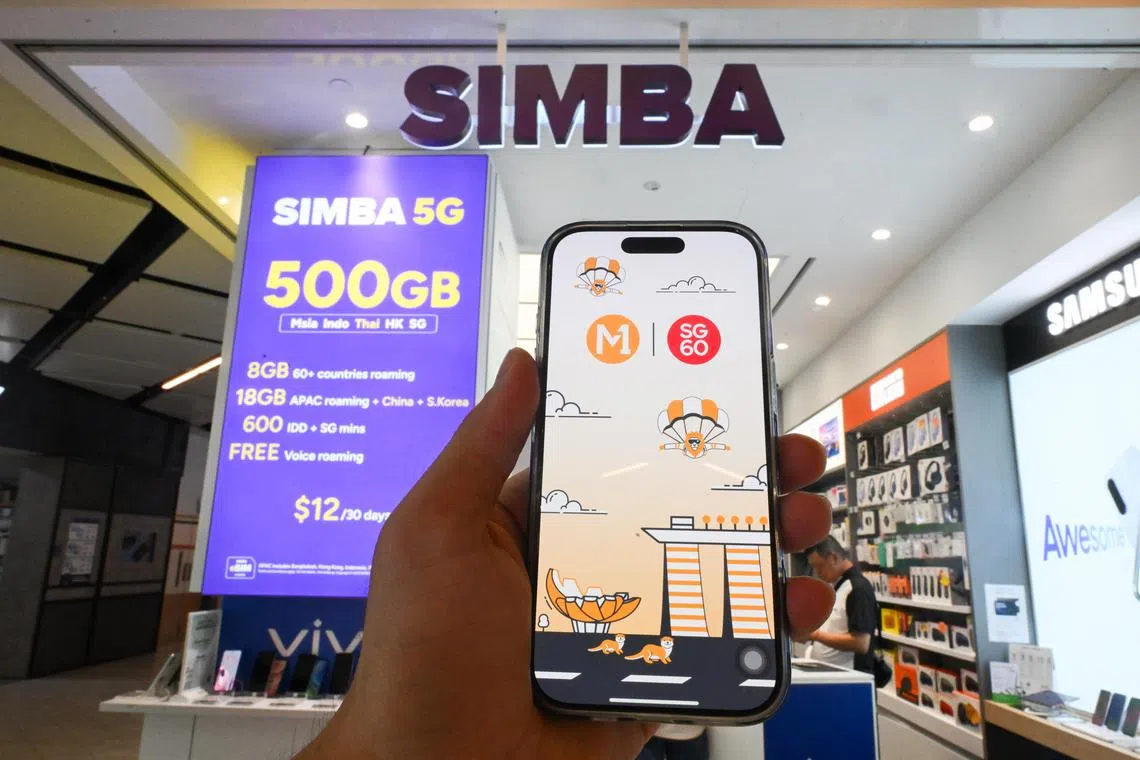Keppel to sell M1’s telco business to Simba for $1.43b, says deal expected to benefit consumers
Sign up now: Get ST's newsletters delivered to your inbox

Keppel will receive nearly $1 billion in cash proceeds for its 83.9 per cent effective stake in M1.
ST PHOTO: SHINTARO TAY
SINGAPORE – Singapore-based Keppel is selling the telecoms business of its subsidiary M1 to rival Simba Telecom for $1.43 billion, in what is the first telco consolidation in Singapore’s history.
The sale has been widely anticipated by market watchers, as telcos here are facing downward pressure on revenue from each subscriber due to the rise of mobile virtual network operators offering cheap plans.
The $1.43 billion deal, announced on Aug 11, factors in cash and debts and is subject to post-completion adjustments.
Speculation had centred on StarHub instead of Simba as the likely buyer until the announcement.
A Keppel spokesperson said that business remains as usual at M1, with no disruption to its offerings and services, while the deal is pending approval by the Infocomm Media Development Authority.
In an analyst briefing on Aug 11, Keppel chief executive Loh Chin Hua said it is too early to tell if retrenchments are needed, reiterating that M1 is already a streamlined, efficient entity with the least overlap with Simba.
M1 and Simba did not reveal how many employees they hire at present.
“The proposed landmark transaction is expected to benefit Singapore’s telecommunications sector and consumers through market consolidation and harnessing synergies between two of the nation’s agile and digitally driven telcos with strong track records for innovation,” Keppel said in a statement.
“It brings together M1’s digitally transformed, cloud-native network with its ability to deliver hyper-personalised services through an advanced tech stack, and Simba’s innovative digital consumer model.”
Simba has more than one million mobile subscribers as at December 2024.
Singtel commands half of the total number of mobile subscribers here, with 4.5 million customers; while StarHub and M1 have about two million subscribers each.
Keppel said Simba put forward the strongest bid among interested parties, with a compelling all-cash offer at an attractive valuation. Simba and M1 also have the least overlap in resources, which Keppel said is expected to create further revenue pools and career opportunities.
M1 chief executive Manjot Singh Mann said Simba’s and M1’s business models are significantly different in terms of subscription plan, retail footprint and approach to customer care.
For instance, M1 has rolled out its dedicated 5G network, while Simba is still rolling out its 5G network. These differences make for more revenue opportunities under one combined entity, he said.
Analysts said the consolidation of four mobile network operators into three could reduce the pressure to undercut one another on price. But the emergence of a stronger Simba-M1 could further threaten Singtel and StarHub’s grip on the Singapore market.
Consumers, on the other hand, are hoping that prices remain affordable and services, reliable.
One M1 customer and business owner in his 50s, Mr Tang S.K., said: “Simba must continue to be reliable and… provide good deals.”
Keppel will receive nearly $1 billion in cash proceeds for its 83.9 per cent effective stake in M1.
The global asset and real-estate manager will retain M1’s fast-growing enterprise business, which will complement Keppel’s connectivity business involving data centres and subsea cables.
It hopes to conclude the transaction in the next few months.
Approval from Keppel shareholders is not required, as the relative figures from the proposed transaction do not exceed 20 per cent of Keppel’s net asset value, profit before tax and market capitalisation.
Approval from Simba shareholders is also not required for the deal, Keppel added.
Simba is owned by Australia-listed telco Tuas.
Keppel said it intends to use the cash to invest in growth opportunities, lower the company’s debt or reward shareholders.
The transaction represents an implied valuation of 7.3 times enterprise value to earnings before interest, taxes, depreciation and amortisation (Ebitda).
M1’s operations, excluding the businesses that Keppel intends to retain, recorded revenues of $806.1 million and Ebitda of $195.4 million in the fiscal year ended April.
Keppel said: “The proposed divestment is in line with Keppel’s strategy as an asset-light global asset manager and operator, and will sharpen the company’s focus within its connectivity segment on digital infrastructure.”
The divestment will result in an accounting loss of $222 million, over the target assets’ book value, computed on a pro forma basis, Keppel estimated. This assumes the proposed transaction had been effected on June 30.
Despite the accounting loss, Keppel said the divestment “crystallises value from Keppel’s investment in M1 over the years”.
Keppel expects to receive more than $700 million in cumulative cash, after considering its initial investment in M1 in 1994 as one of its founding members and the subsequent privatisation of the telco in 2019, as well as dividends and divestment proceeds from 1994 to 2025.
Shares of Keppel were halted from trading on Aug 11 before the announcement. They closed down 0.8 per cent at $8.58 on Aug 8.
Simba’s parent Tuas said the acquisition will be funded by a mix of existing cash, equity raising and $1.1 billion in fully underwritten bank debt financing.
The equity raising of about A$416 million (S$348.2 million) comprises an institutional placement of about A$366 million and a share purchase plan for eligible shareholders totalling up to A$50 million.
In the Aug 11 analyst briefing, Keppel chief finance officer Kevin Chng said the accounting loss was primarily driven by “goodwill and intangibles”.
He added that the attractiveness of the transaction lies in not just the amount, but also in freeing up cash to make investments, reduce debt or reward shareholders.
Responding to queries, a Singtel spokesperson said the telco is assessing the implications of the proposed transaction, and pledged to continue its investments in technology to better support customer needs.
StarHub, on the other hand, hailed the Simba-M1 deal as a development that could bring greater stability and opportunities for innovation.
Both StarHub and Singtel did not respond to questions on whether they made an offer for M1.



